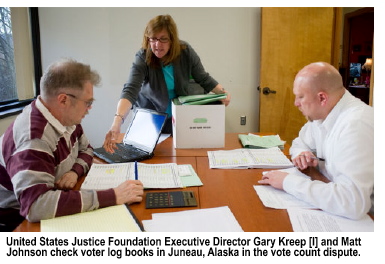
News
Behind the Headlines
Two-Cents Worth
Video of the Week
News Blurbs
Articles
Testimony
Bible Questions
Internet Articles (2015)
Internet Articles (2014)
Internet
Articles (2013)
Internet Articles (2012)
Internet Articles (2011)
Internet Articles (2010)
Internet Articles
(2009)
Internet Articles (2008)
Internet Articles (2007)
Internet Articles (2006)
Internet Articles (2005)
Internet Articles (2004)
Internet Articles (2003)
Internet Articles (2002)
Internet Articles (2001)


History
is being written in Alaska whichever way
the US Senate race between Miller and Murkowski
ends. Either we have the second US Senator in
history
elected by a write-in vote, or the second
political race settled by Bush v Gore's 3 USC 5.
Fraud
remains the benchmark of Alaska elections.
Miller v Murkowski is on its way to court.
The American people need to pay attention to the most important
political race in the nation. There's a real vote fraud story
going on in Alaska. Lawyers for the Tea Party's GOP US Senate nominee,
Joe Miller have now filed wnough lawsuita over the write-in
vote dispute in the land of the midnight sun tor bring Miller
v Murkowski into the courtrooms even though the AP, on Nov.
17, said the race is over and Sen. Lisa Murkowski was the
winner. Shortly after the election Miller set up a vote fraud
hotline to report what the Miller Campaign called "...serious
allegations of fraud and voter bullying." As they have
all over the country, reports alleging both vote fraud and voter
bullying in Alaska began to surface shortly after the election.
 The
Miller Campaign invited two well-known conservative leaders
to join a team going to Alaska on his behalf to monitor the counting
of both write-in and absentee ballots—as well as to investigate
allegations of vote fraud. Invited by the Miller Campaign
were columnist and veteran broadcaster Floyd Brown, head
of The Western Journalism Center
in Sacramento, and Gary Kreep, Esq., the lead attorney and
Executive Director of the US Justice Foundation headquartered
in Ramona, California. Kreep, Brown and World
Net Daily founder Joe Farah launched a nationwide appeal
to voters even before "early voting" began. The purpose
was to ferret out indications of voter fraud, voter intimidation
before races were conceded or victories were declared and to investigate
them and, if necessary, file lawsuits to correct wrongs and place
into office the candidates the people believed they had honestly
elected.
The
Miller Campaign invited two well-known conservative leaders
to join a team going to Alaska on his behalf to monitor the counting
of both write-in and absentee ballots—as well as to investigate
allegations of vote fraud. Invited by the Miller Campaign
were columnist and veteran broadcaster Floyd Brown, head
of The Western Journalism Center
in Sacramento, and Gary Kreep, Esq., the lead attorney and
Executive Director of the US Justice Foundation headquartered
in Ramona, California. Kreep, Brown and World
Net Daily founder Joe Farah launched a nationwide appeal
to voters even before "early voting" began. The purpose
was to ferret out indications of voter fraud, voter intimidation
before races were conceded or victories were declared and to investigate
them and, if necessary, file lawsuits to correct wrongs and place
into office the candidates the people believed they had honestly
elected.
Even before
the votes were tallied, the mainstream media led by the Anchorage
Daily News quoting a statement made by Murkowski and
reported that the Miller-Murkowski race was only the second
election in history where a write-in candidate won a US Senate seat.
Fox News picked up the rhetoric as well, repeating Murkowski's
statement as a news blurb whenever they cited the statistics on
the count tabulations in Alaska. Not once in their reporting did
Fox News nor any other media outlet report that the decision
made by Alaska's Lt. Governor, Craig Campbell, who has long-term
ties with the Murkowski family through Lisa Murkowski's
father, a former governor and US Senator,  to
ignore Alaska law and determine
the validity of the write-in votes for Lisa Murkowski based
on "voter intent" rather than Alaska law which mandates
that the names on the write-in ballots must be spelled exactly as
the name was spelled on the write-in candidate's registration for
the office he or she was seeking.
to
ignore Alaska law and determine
the validity of the write-in votes for Lisa Murkowski based
on "voter intent" rather than Alaska law which mandates
that the names on the write-in ballots must be spelled exactly as
the name was spelled on the write-in candidate's registration for
the office he or she was seeking.
The Alaskan State law was specifically written to prevent write-in candidates, whom the establishment party leaders never thought would be them, from getting enough qualified votes to win any election. And, just as the law works against every "Average Joe" citizen candidate tired of "business as usual in Juneau," the law worked against Murkowski, whose name isn't as easy to spell as "Smith" or "Jones" when the voter has to write it in on the ballot. Thousands of Murkowski ballots are not valid based on Alaska law because the name Murkowski was misspelled. Yet, the establishment politicians counted them, arguing because "voter intent" was clear, it is not right to deny the voter his or her constitutional right to put into office the candidate he or she wants to represent them. Unless, of course, that representative is not an establishment candidate. Then, the name must be spelled correctly or the vote is invalid and will be discarded. In other words, in Alaska, voter intent is important as long as the voter intended to vote for the establishment candidate.
Like the
polling judges in Florida who saw Vice President Al Gore's
chance of beating Texas Gov. George W. Bush vanishing like
dancing chads, and changed the rules to allow election judges to
decide what the voter was thinking and use voter intent because
a chad may have looked like someone intended to punch it even if
it was hanging simply because the ballot was handled too many times.
 This
led to the historic legal challenge that went through the State
court system and, ultimately, into the US Supreme Court where the
high court agreed with the argument of Bush-43 lawyer Ted
Olson that the Electoral Vote Count Act of 1887 (3 USC
5) requires that the votes be tabulated based on the vote count
guidelines in effect when the first vote in the election was cast.
The US Supreme Court agreed. The vote count law in effect when
the the first ballot is cast is the law by which the ballots are
counted. You can't abrogate the rules simply because it benefits
you to do so. Unless, of course, you're an Alaskan.
This
led to the historic legal challenge that went through the State
court system and, ultimately, into the US Supreme Court where the
high court agreed with the argument of Bush-43 lawyer Ted
Olson that the Electoral Vote Count Act of 1887 (3 USC
5) requires that the votes be tabulated based on the vote count
guidelines in effect when the first vote in the election was cast.
The US Supreme Court agreed. The vote count law in effect when
the the first ballot is cast is the law by which the ballots are
counted. You can't abrogate the rules simply because it benefits
you to do so. Unless, of course, you're an Alaskan.
In the
State of Alaska, the law specifies that for any write-in ballot
to be accepted, the name on the ballot must be written exactly as
the candidate recorded his or her name on their registration for
office. The State construes it is the responsibility of the candidate
to make sure he or she has educated the voter sufficiently to spell
his or her name correctly on the ballot.  When
the law, promulgated by Alaskan politicians like Frank Murkowski,
Lisa Murkowski's father, worked against the establishment
Republican who lost her slot as the ballot, the establishment politicians
decided to void, by decree, the law they enacted to protect the
status quo party candidates on either side of the aisle.
When
the law, promulgated by Alaskan politicians like Frank Murkowski,
Lisa Murkowski's father, worked against the establishment
Republican who lost her slot as the ballot, the establishment politicians
decided to void, by decree, the law they enacted to protect the
status quo party candidates on either side of the aisle.
After the Associated Press called the election for Murkowski on Nov. 16, USJF head Gary Kreep was asked to return to Alaska by Joe Miller. Kreep was back in Juneau on Nov. 17. From his hotel room, Kreep wrote "...for decades a small group of liberal Republican-in-name-only officeholders have controlled Alaska politics. Ted Stevens, Don Young, Frank Murkowski and now, Lisa Murkowski, have all treated Alaska like their own little kingdom...Now this group of RINOs will stop at nothing to protect their control by keeping Lisa Murkowski in one of Alaska's Senate seats 'by hook or crook.'"
Miller's early-count election advisory team, including Floyd Brown and Gary Kreep uncovered scores of irregularities and, in the early first round of counting, the team picked up just under 3,000 votes for Miller. Several of these votes, strangely, were write-in votes that the election judges initially discarded since Miller's name was printed on the ballot and thus, in their mind, there was no need for the voter to write in his name. Clearly, voter intent was to vote for Miller. A vote for "McKowie" or "Mulkalkie" or anything else that could be construed as a Polish-sounding name that started with an "M" was deemed to be a vote for Murkowski based on "voter intent." But a write-in vote for Joe Miller—of which there were apparently several—was not. In the end, the DOE was obligated to count the write-in votes for Miller they had previously discarded because his name was on the ballot.
Very early on—since a lot of voters, it seems, couldn't spell Murkowski— the DOE employees began to accept ballots with minor spelling errors for Murkowski. As the counting proceeded into the weekend, it was clear to the DOE that if Murkowski was going to prevail, the State spelling requirement had been completely abandoned. Campbell, through Alaska Division of Elections Director Gail Fenumiai gave their personnel the discretion to make decisions about "voter intent." A ballot cast for "Macowski" was just as good as a vote for Lisa Murkowski even though State law required those ballots to be rejected.
 When
it became clear to the Miller team that Alaska's vote count
law was going to be abandoned in order to give Murkowski
the benefit of as many votes as possible, Miller's personal
lawyer, Thomas Van Flein, filed suit in federal court. As
election judges counted anything that resembled a vote for Murkowski,
the unseated GOP incumbent posted a lead of 11,557 votes. When the
absentee ballots were counted, Miller narrowed the gap by
almost 2,000 votes.
When
it became clear to the Miller team that Alaska's vote count
law was going to be abandoned in order to give Murkowski
the benefit of as many votes as possible, Miller's personal
lawyer, Thomas Van Flein, filed suit in federal court. As
election judges counted anything that resembled a vote for Murkowski,
the unseated GOP incumbent posted a lead of 11,557 votes. When the
absentee ballots were counted, Miller narrowed the gap by
almost 2,000 votes.
Murkowski's lawyer—brought along like a seeing eye dog—was Ben Ginsberg. Ginsberg, you will recall, worked for Bush and Cheney in 2000. Murkowski came with the big guns because she knew she was going to violate Alaska law and she needed enough muscle to make it stick.
In the 2000 election, it came down to hanging chads. In Alaska, there are no chads. It's a paper ballot. You color in a circle with a pencil to pick your candidate. If your candidate is not on the ballot, you color in the circle and write in a name. And, there's the crux of the issue. Alaska law says you must spell the name precisely as the candidate recorded his or her candidacy. Under State law, even if Murkowski registered as Lisa Murkowski, "Murkowski" is valid. That's the only leeway allowed. Based on a ruling by the Lt. Governor, election officials were arbitrarily allowed to use discretion in determining "voter intent" where it was clear from the misspelling that the voter intended to vote for Murkowski. And, although Flein asked for an injunction to stop the vote until the federal court could rule on the case, Campbell said the count would continue on schedule. He told the Miller camp that Fenumiai would be on hand to settle disputes on challenged votes. Fenumiai settled the disputes by allowing absolute discretion to accept anything that looked like it might be a vote for Murkowski as a vote for Murkowski. It was Florida 2000 all over again.
On Wed., Nov. 10, 2010 attorney Kreep was an observer at Table 2. The women at that table, who were there on behalf of the Division of Elections told him that, at their briefing by DOE staff members, they were told it was "the law" that as long as three or less letters in the name were incorrect, the ballot had to be accepted. Throughout the week, Kreep watched, and disputed, ballots the DOE accepted for Murkowski with names like McKoskie (3 letter discrepancy), McKowkie (4 letter discrepancy), Murowski, (2 letter discrepancy), Merkouski (3 letter discrepancy), Murkaski (3 letter discrepancy), Mursowski (2 letter discrepancy), and Mulkalkie (7 letter discrepancy). (Clarification: my definition of a discrepancy is any letter appearing in either Murkowski's name or the ballot spelling not appearing in both versions. I'm certain the DOE's definition deals only with the version on the ballot.) State law emphatically mandates that the name on the ballot must be written exactly as the candidate's name was spelled on his or her registration for office. In Murkowski's case, the name on her registration was Lisa Murkowski.
But the rules were about to loosen up even more—just as they were in Florida in 2000. When the cheaters need more votes, they simply make the rules more lax. On Thursday, Nov. 11, Kreep overheard a male attorney, "Mike," tell Gail Fenumiai that there were three syllables in Mur-kow-ski, and as long as two of the syllables were okay, she should overrule any challenge. That's called making up the rules as you go. Come to think of it, that's precisely what Gore's people did in Florida in 2000—made it up as they went along.
I guess that means if the name Kowski appeared on the ballot, it would be acceptable. McKowkie was. I wonder if Murskie would have worked? Or Murkow? Fenumiai did deny "Merk" as a legitimate vote for Murkowski. Said within earshot of Kreep, it was probably rejected solely for his benefit to theoretically show Joe Miller's guy that she was unbiased and was evenly discerning "voter intent."
In response to the decision of the Alaska Division of Elections, on Nov. 9, Flein filed suit in federal court challenging Campbell's decision to let "voter intent" color the ballot count since it was clearly against established law to do so. In Alaska, the establishment politicians on both sides of the aisle want the proverbial bird in the hand, but they also want two birds in the bush...or, in this case, in the ballot box.
The Alaska race came down to the wire with Miller trailing by some 10,000 votes. Election fraud, a staple in Alaska politics going back at least to the 2004 election when Murkowski won the US Senate seat given to her by her father, Frank Murkowski. He was a sitting US Senator when he ran for, and won the governorship of the State in 2002. As Governor, he appointed his daughter to serve his last two years. With several lawsuits between Miller and Murkowski still pending and a murky election history that include election results that seem to defy mathematical logic, repeated failures of the State's Diebold voting machines and Alaskan Division of Elections' history of blocking citizen oversight of election results, the Miller team said it would decide by the end of the week if it would demand a hand recount. On Nov. 17 Miller appeared as a guest of Neil Cavuto on Fox News. Miller told Cavuto that an election contest cannot be filed until the race is certified by the State. "We'll wait and see when these numbers finally sort out here at the end of the week. The voters of the State of Alaska expect there to be integrity in the process. We are going to pursue that. The process that has gone down so far has been a hand count of the write-in ballots..There has not been a hand count of the other ballots. The other ballots have all gone through a machine count process. The machine count historically has had inaccuracies involved in it."
On Nov.
18, as the Division of Elections was about to certify McKoskie,
or Merkouski, or Mulkalkie, or whatever her name was
at that particular moment, as reelected to the US Senate, Miller's
team got their first real break in the election ordeal.  Disgusted
when he learned that most of the rejected ballots Miller's
team rightfully contested ended up back in the legitimate ballot
stack, Kreep prepared an affidavit on Nov. 18, attesting
to the irregularities he witnessed which clearly violated not only
Alaska law but 3 USC 5. The affidavit was submitted to the US District
Court for the District of Alaska as part of Case 3:10-cv-0252-RRB.
On the 19th, US District Court Judge Ralph R. Beistline,
a native of Fairbanks and a George W. Bush appointee, denied
a motion by the State of Alaska to dismiss Miller's petition
on the grounds there was a lack of federal jurisdiction, forcing
the matter of Miller v Murkowski into the State court system.
Disgusted
when he learned that most of the rejected ballots Miller's
team rightfully contested ended up back in the legitimate ballot
stack, Kreep prepared an affidavit on Nov. 18, attesting
to the irregularities he witnessed which clearly violated not only
Alaska law but 3 USC 5. The affidavit was submitted to the US District
Court for the District of Alaska as part of Case 3:10-cv-0252-RRB.
On the 19th, US District Court Judge Ralph R. Beistline,
a native of Fairbanks and a George W. Bush appointee, denied
a motion by the State of Alaska to dismiss Miller's petition
on the grounds there was a lack of federal jurisdiction, forcing
the matter of Miller v Murkowski into the State court system.
Beistline countered the State of Alaska's argument that the federal judiciary had no jurisdiction by saying "...The Court has federal question jurisdiction to hear this matter given the significant constitutional questions arising from the dispute between the parties as to whether the Division of Elections has, among other things, violated the Alaska Legislature's prerogative by counting votes in a manner contrary to the legislative directive."
The Miller team also asked the Court to enjoin the defendants from certifying the results of the 2010 US senatorial race. Judge Beistline granted their motion to enjoin certification of the election providing an action was filed in State Court on or before November 22, the election results cannot be certified until the legal issues are fully and finally resolved in a court of law.
In 2004 when the Democrats challenged Murkowski's Senate race win due to what they termed were "remarkable anomalies in the 2004 results," the Alaska Democratic Party asked for the election database of that race so they could examine the irregularities they found. The Division of Elections refused, saying all of the available data was already posted on their website and the Democrats could access the information there. Everyone seemed to know that the Accurate Optical Scanners in the Diebold Global Election Management System sucked because of an anomaly that deleted the first batches of scanned ballots under certain circumstances. (Programming, perhaps?). That's why California decertified the GEM system.
In April, 2006 the Democrats sued for the files. At that time, the Board of Elections argued that the data was the sole property of Diebold, not the voters of the State and therefore the State lacked the authority to turn the data over to the Democratic Party. Later the State said they didn't keep hard copy files. After the Democrats agree to pay the price demanded by the State for the data, the State advised them the information would not be forthcoming because releasing it posed a security risk to the State. A short time later the Democrats again demanded the vote count database, and once again they were denied the information despite a court order ordering that the State surrender the information to the Alaska Democratic Party. How's that for transparency?
Just before the State Supreme Court weighed in, the Board of Elections "found" the database they insisted they did not have, and surrendered it to the Democratic Party. In the 2004 US Senate race in which Murkowski won the seat bequeathed to her by her father two years earlier, prevailed with a Board of Elections "certified" ballot total of 226,992 votes. The only problem is, her official total was only 149,446 votes—77,546 votes less than the Board of Elections said she won when they certified the election. The problem was that Murkowski was certified as the winner of that race with what was purported to be 48.6% of the vote. Her opponent, former Alaska Gov. Tony Knowles garnered 45.5% of the vote. Since there were a total of 312,598 votes cast in Alaska during the Election of 2004, and Knowles took 45.5% of the vote, he received 141,394 votes. Murkowski still won the election, but only by a margin of 8,052 votes. It was not the easy win it appeared to be. And, since she won with only a 2% margin, Knowles was eligible for a recount. With an 85,598 vote margin favoring Murkowski, Knowles was the clear loser. But, nothing is all that clear in Alaska politics since voter transparency is nonexistent in the land of the midnight sun. It is important for voters to understand that voting machines of any type, particularly touch screen computers which are hooked up to an easily manipulated main frame, or any system other than an old-fashioned paper ballot that must, by law, be hand-counted, is devised not to expedite the count but to cheat the voter.
The action of the Joe Miller team stopped the certification of the 2010 election and the awarding of Alaska's up-for-grabs US Senate seat to Murkowski. If Murkowski had been seated, then the US Senate would constitutionally decide who won the election if there was a dispute. Which, of course, there was—and is. Given the political ideology of the current US Senate, it's clear that Harry Reid would prefer left-leaning Murkowski over right-leaning Miller.
In the end, the odds are still about 50-50 that Miller v Murkowski will end up in US Supreme Court because if we learned anything from the battle to steal a US Senate seat by the establishment Republicans in Alaska, it's that the State of Alaska writes its own rules. I guess that's why Judge Beistline retained jurisdiction as he passed it off to a State court, pursuant to "Pullman" (Railroad Commission v Pullman Co., 312 US 499 (1941).
In the State of Alaska, government is apparently whatever government it wants to be. Obviously the will of the people simply does not count. I guess when a sovereign US State is only 90 miles from the Soviet Union, totalitarianism is carried by the wind.

Copyright © 2009 Jon Christian Ryter.
All rights reserved.


